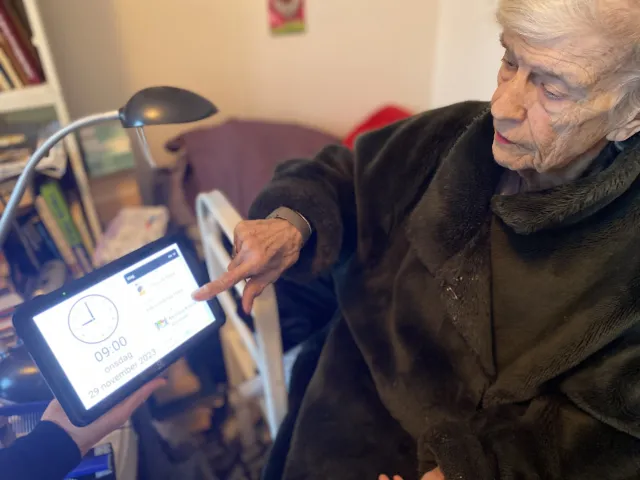Abilia, together with the testbed Verklighetslabbet, has made a joint pilot project in the Årsta Home Care service group in Sweden, where elderly people with Home Care services were able to try the digital cognitive solution CARY Base.
CARY Base is a cognitive solution that helps the user orient themselves in time, keep track of the day's planned activities and receive personal reminders. The Home Care staff entered activities remotely into CARY Base and the elderly then received information about, for example, upcoming Home Care visits described in text, images and speech synthesis if desired.

The aim of the project was to get feedback on the solution from both the care recipient and the operational perspective, where the experience of the elderly, Home Care staff and unit manager was in focus.
It was a good opportunity to test welfare technology, in the form of Abilia's digital solutions, where the need for security and predictability play a big role for both individuals and operations.
CARY Base was installed for eleven elderly people with Home Care interventions during the test period September – November 2023 in the municpality of Årsta, Sweden.
Challenges in elderly care
Årsta Home Care service group chose to participate in the pilot project as they saw the value based on the challenges that exist with an aging population and more people who need to stay at home longer with the support of Home Care services. Competence provision in care is also a challenge.
Årsta Home Care group consists of approximately 50 employees with 180 care recipients, of which 50 of these only have security alarms. Efforts and time frames at home for the elderly are assessed via assistance. They have an assistant nurse as permanent care contact where continuity is the basis.

Results, lessons learned and insights
The digitalisation project in the Årsta Home Care group included eleven elderly people with Home Care who had CARY Base installed in their home for two months. Staff, including the administrator and unit manager from the Årsta Home Care group were also important participants in the project, where above all the administrator entered information about planned activities for each of the elderly.
Abilia was responsible for training the staff and follow-up. In addition, Abilia also interviewed one of the older users and one person from the staff group.
Verklighetslabbet was responsible for evaluating and compiling the pilot project through questionnaires, measurements and interviews with staff, care recipients and unit managers.
The evaluation of questionnaires and interviews yielded the following overall impressions about CARY Base:
- Gave great value to the elderly
- Many of the elderly became calmer and safer when they knew what, when and with whom interventions should take place
- Reduced conflicts and misunderstandings around efforts
- Was easy to use and understand for the senior staff and the administrator
- Took time for the admin to enter the activities, but saved some time in the actual execution of the efforts
- Was good for people with impaired hearing and cognitive impairment
- Could make the communication clearer between the elderly and staff with a mother tongue other than Swedish
- Led to less need for motivational talks and less stress for both the elderly and the staff
- Showed the importance of the solution needing to be properly adapted for each individual from the start
- 89% of the elderly who participated in the project wanted to keep the solution
If you want to know more, contact Mikael Lundin
About the testbed Verklighetslabbet
The Verklighetslabb (Stockholm, Sweden) has been a unique test bed for research, innovations and working methods since 2017 where products, working methods and services are tested that can contribute to the development of today's and future care for the elderly. It is an arena for co-creation between the elderly, relatives, staff, innovators, students and researchers. The purpose is to offer a realistic development environment with the goal of testing projects with a focus on welfare technology and digitization.

